12 Proven Sales Approaches to Boost Performance
Casey O'Connor
Contents
- What Is a Sales Approach?
- Why Mastering Your Sales Approach Is Crucial for Sales Success
- 12 Types of Sales Approaches
- How to Choose the Right Sales Approach
- How to Optimize Your Sales Approach for Faster Closes and Better Outcomes
- How to Implement Sales Approaches
- Conclusion
- Frequently Asked Questions About Sales Approaches
The right sales approach can make a big impact on your overall sales performance.
Sales managers and the sales reps on their teams need to have a solid understanding of their target market in order to choose the sales approach(es) that are most likely to resonate with their buyers.
In this article, we’ll go over everything you need to know about choosing sales approaches that close deals and drive revenue, including 12 of our favorite sales approaches, how to choose the right one(s) for your team, and how to implement the approach(es) you choose for your team.
Here’s what we’ll cover:
- What Is a Sales Approach?
- Why Mastering Your Sales Approach Is Crucial for Sales Success
- 12 Types of Sales Approaches
- How to Choose the Right Sales Approach
- How to Optimize Your Sales Approach for Faster Closes and Better Outcomes
- How to Implement Sales Approaches
- FAQs
What Is a Sales Approach?
A sales approach is defined as the set of techniques, strategies, and tactics that sales reps use to move sales opportunities forward and close deals.
Sales approaches are designed to meet the needs of buyers more effectively so that sellers can close deals more efficiently.
A combination of factors will determine the right sales approach for you and/or your team, including your personality, sales experience, and your buyer’s preferences.
Each sales approach has its own benefits and drawbacks and can offer different strengths to your sales process depending on your team’s makeup and your market’s needs.
Why Mastering Your Sales Approach Is Crucial for Sales Success
In the dynamic world of business, sales isn’t just a department; it’s the lifeblood of growth and innovation. While the core objective remains consistent—to generate revenue—the strategies and tactics employed to achieve that goal are constantly evolving. Understanding and mastering your sales approach is imperative for individual sales professionals and the organizations they serve.
The Significance of Sales in Business and the Economy
Sales roles are far more than just “order takers” or “pitch artists.” They are the direct link between a company’s products or services and its market. In the United States alone, sales occupations make up a substantial portion of the workforce, underscoring their vital economic contribution.
Sales professionals drive demand, introduce innovations, and facilitate the exchange of value that keeps economies moving. Without effective sales, even the most groundbreaking products would languish, and businesses would struggle to find their audience and achieve sustainable growth.
Beyond “One-Size-Fits-All”: The Need for Diverse Strategies
The days of a single, universally effective sales script are long gone. Today’s buyers are more informed, more discerning, and have more options than ever before. What works for selling enterprise software to a large corporation will likely fail when selling a consumer product online, and vice versa.
Mastering your sales approach means understanding that there isn’t a “one-size-fits-all” solution. Instead, it requires:
- Flexibility: The ability to adapt your strategy based on the specific prospect, product, industry, and stage of the buying cycle.
- Discernment: Knowing when to deploy a consultative approach versus a more direct one, or when to prioritize relationship building over a quick close.
- Versatility: Equipping yourself and your team with a diverse toolkit of approaches to navigate any sales scenario successfully.
Relying on a single, rigid method in a dynamic market is akin to trying to fit a square peg into a round hole – ineffective and frustrating.
Direct Impact on Key Business Outcomes
The choice and execution of your sales approach directly correlate with your most critical business metrics. A refined sales approach isn’t just about making individual sales reps more productive; it has a ripple effect across the entire organization:
- Faster Closes: By aligning your approach with the buyer’s journey and effectively addressing their needs and objections, you can significantly reduce the length of your sales cycle.
- Higher Conversion Rates: A well-matched approach resonates more deeply with prospects, leading to increased trust and a greater likelihood of converting leads into paying customers.
- Improved Customer Satisfaction & Loyalty: Approaches focused on understanding needs and building relationships lead to better-fit solutions and a positive customer experience, fostering long-term loyalty and reducing churn.
- Increased Revenue & Profitability: Ultimately, more efficient sales processes, higher conversion rates, and stronger customer retention all contribute directly to a healthier bottom line and sustained business growth.
In essence, mastering your sales approach is about working smarter, not just harder, transforming sales from a mere transaction into a strategic engine for business success.
12 Types of Sales Approaches
Here are 12 of the most effective sales approaches for sales managers and sales teams to consider. 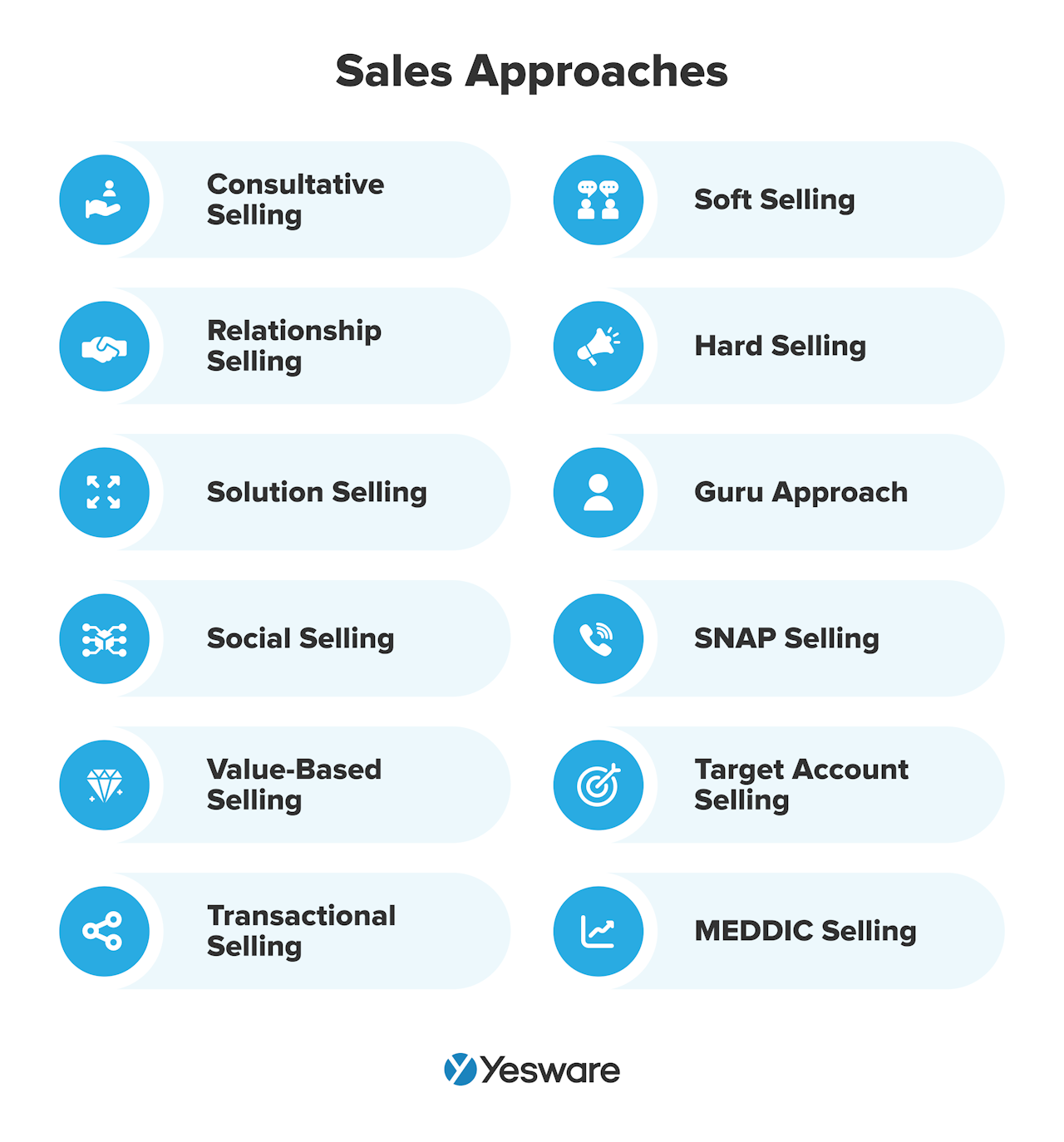
1. Consultative Selling
Consultative selling is a customer-focused B2B sales approach that positions sales reps as trusted advisors in the sales process that can provide customized solutions. 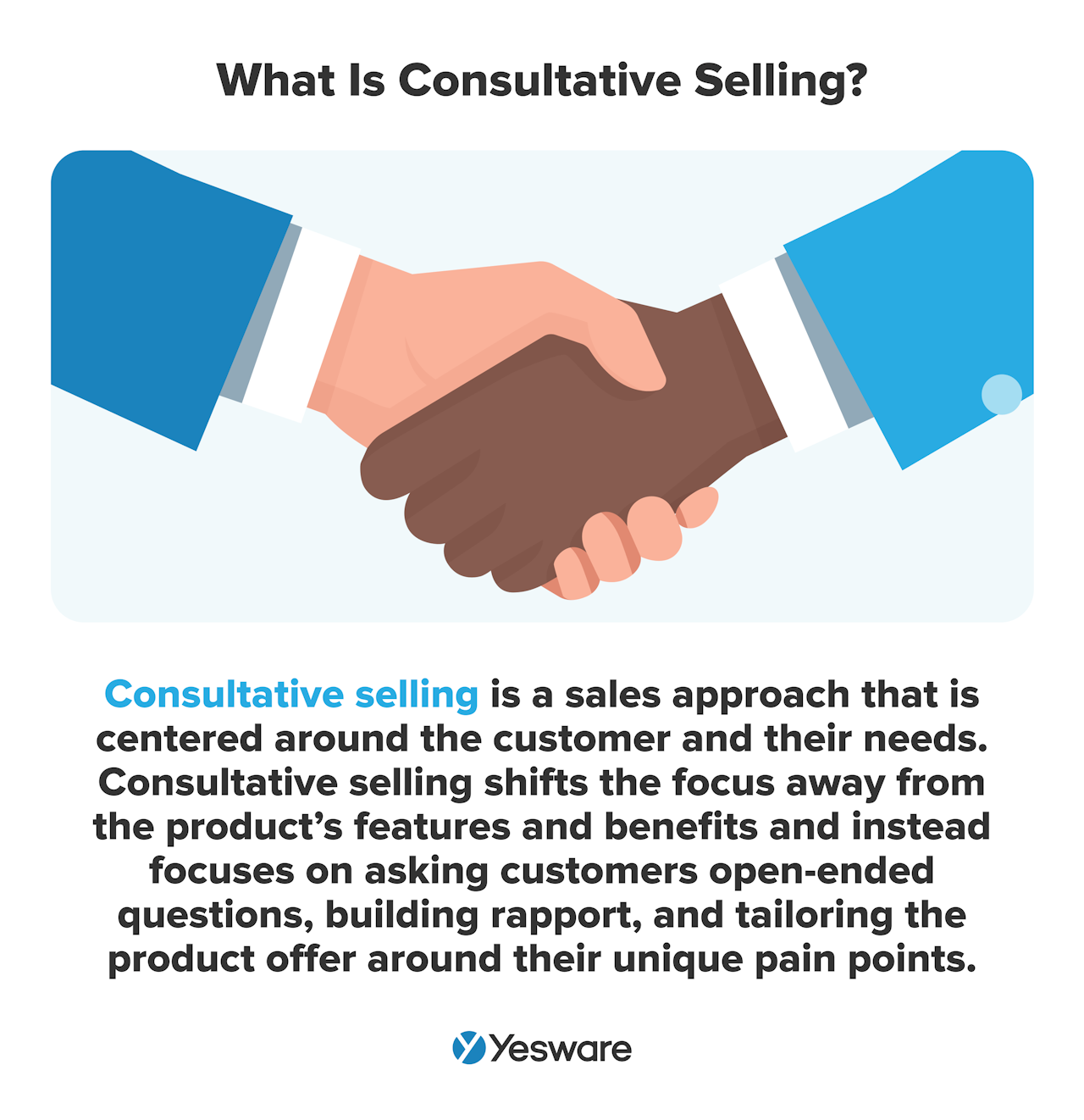 This approach centers around trusting buyer-seller relationships that lead to a deep understanding of customer pain points and customized solutions tailored around solving them.
This approach centers around trusting buyer-seller relationships that lead to a deep understanding of customer pain points and customized solutions tailored around solving them. 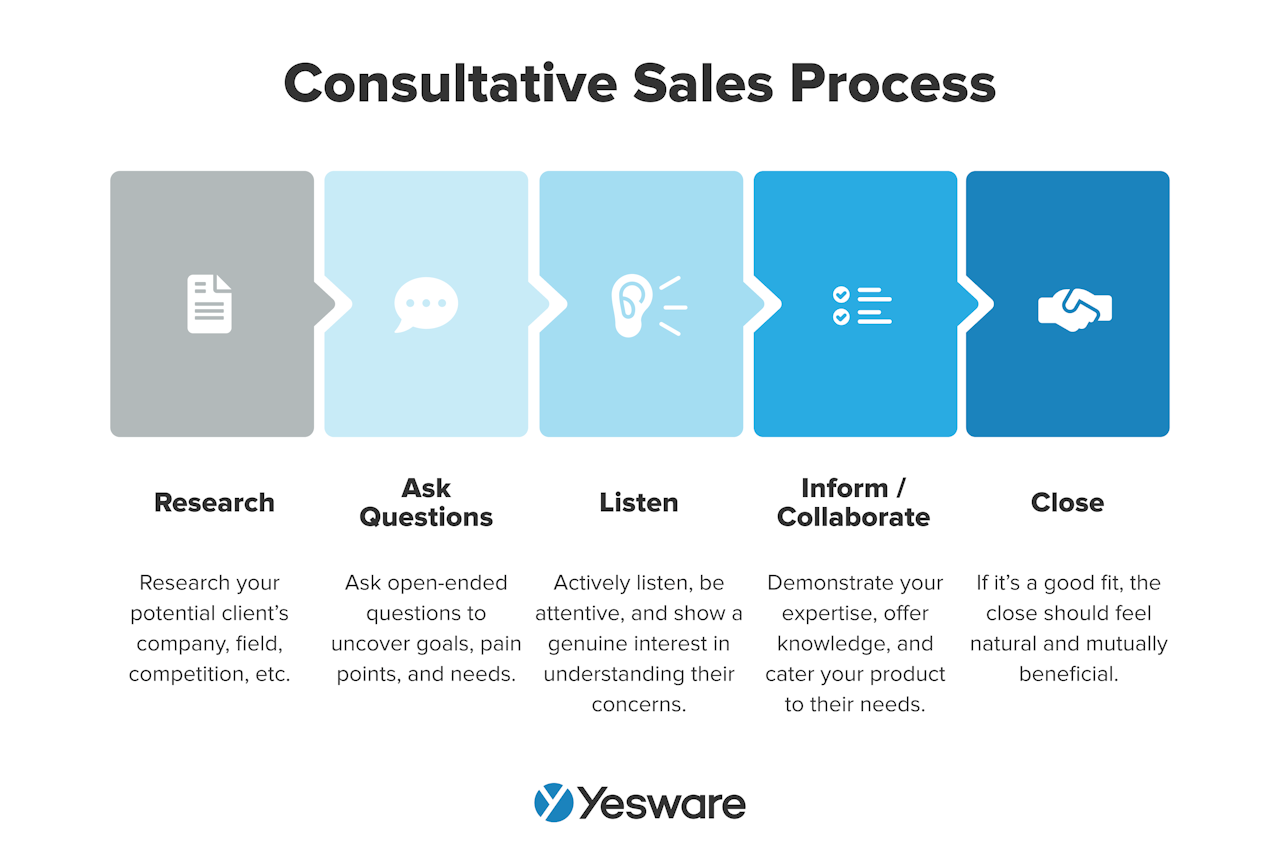 Consultative selling can be very effective in generating repeat sales, cross-sells, and upsells.
Consultative selling can be very effective in generating repeat sales, cross-sells, and upsells.
Consultative selling can take a longer time to master and implement than some of the others on our list, but it’s a very effective approach for many buyers and target markets.
2. Relationship Selling
Relationship selling is similar to consultative sales in that both approaches focus heavily on building long-term relationships with buyers. 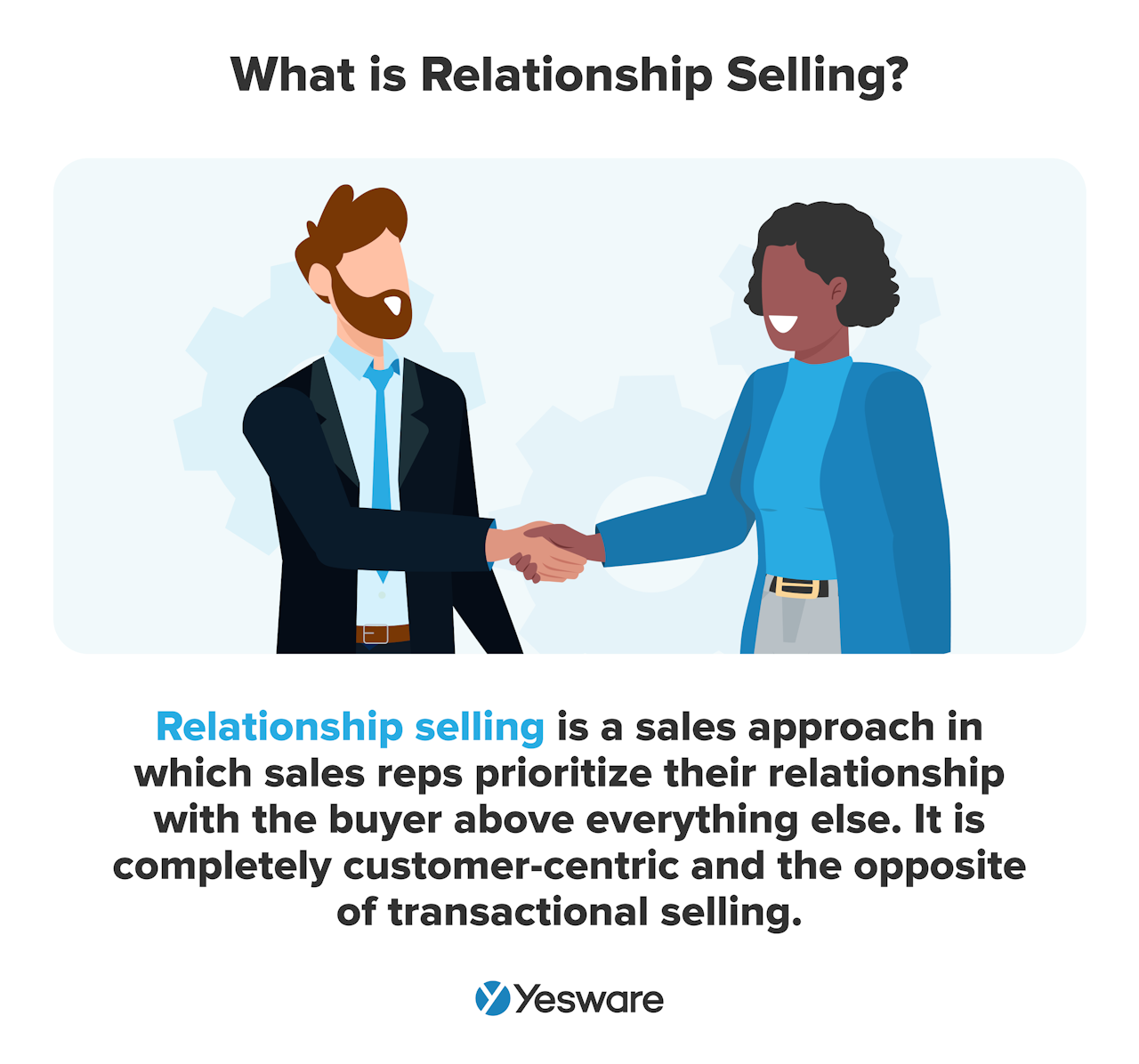 Sales teams that master how and when to implement relationship selling enjoy many benefits.
Sales teams that master how and when to implement relationship selling enjoy many benefits.
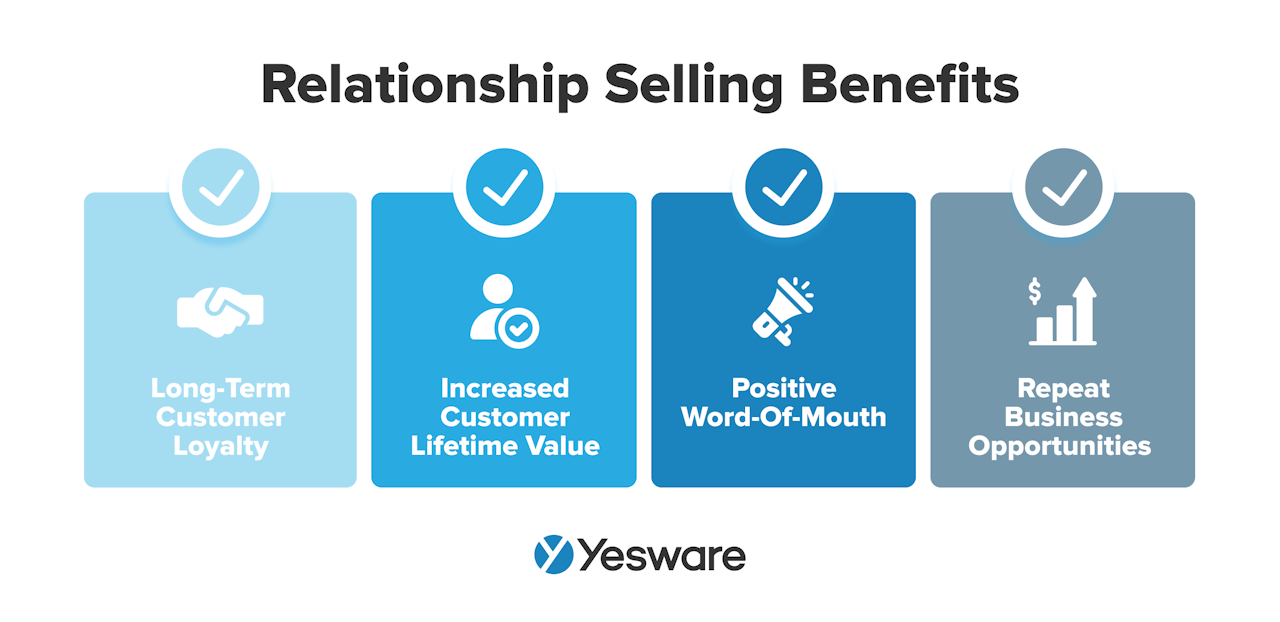
One easy way to start building relationship selling into your sales process is by implementing regular check-ins with clients. This helps build trust and loyalty.
In relationship selling, the relationship between buyer and seller is more important than the sale itself.
3. Solution Selling
The focus of solution selling is slightly different than others we’ve covered so far.
Rather than centering around the relationship, a Solution Selling approach prioritizes finding a bespoke, comprehensive solution that’s customized to the client’s unique needs. 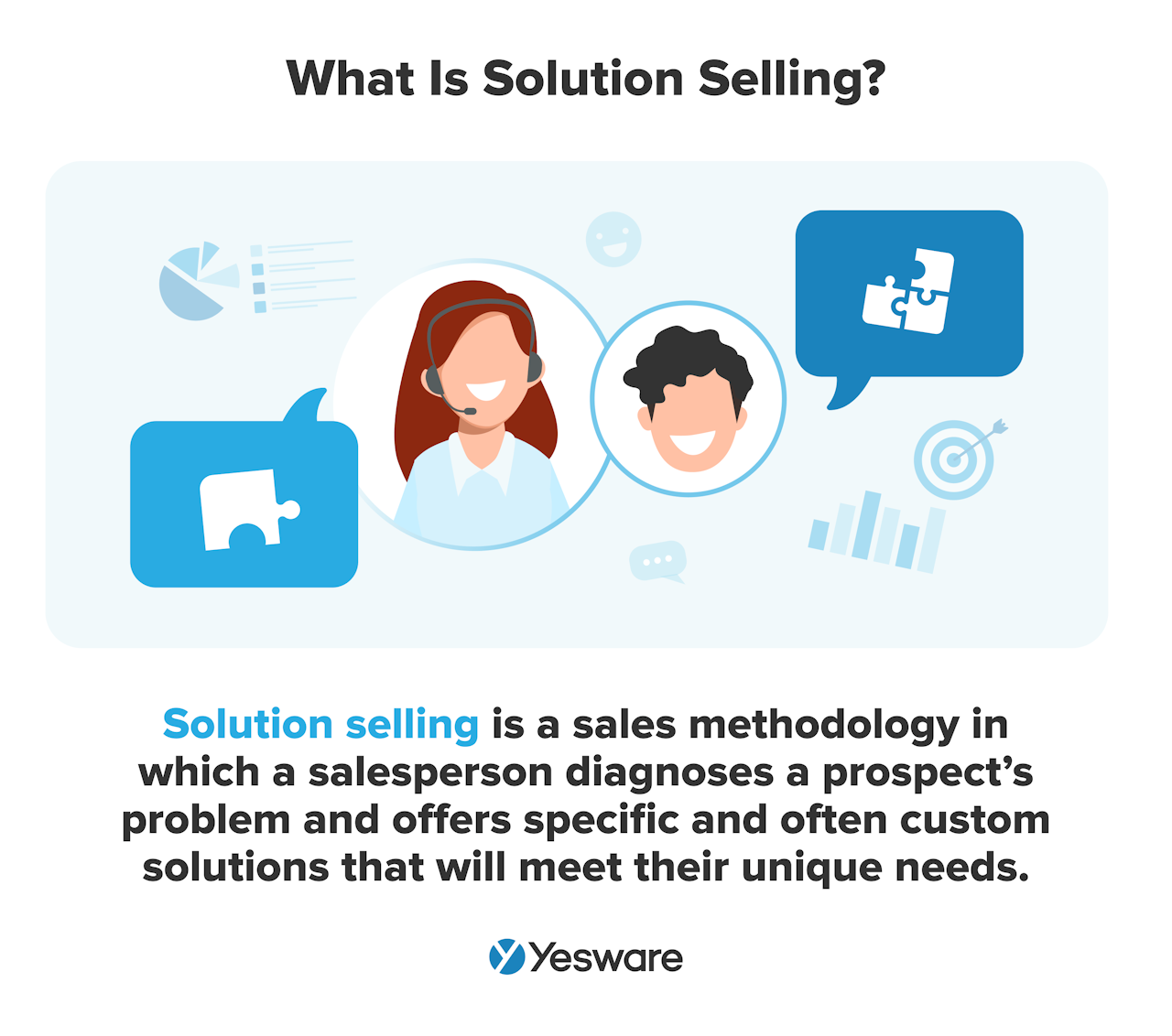 Solution selling is all about solving customer problems as completely as possible and letting the customer’s pain points, challenges, and needs steer the sales process.
Solution selling is all about solving customer problems as completely as possible and letting the customer’s pain points, challenges, and needs steer the sales process.
The solution-selling process generally follows the same six-step framework: prospect, qualify, discover, add value, present, and close. 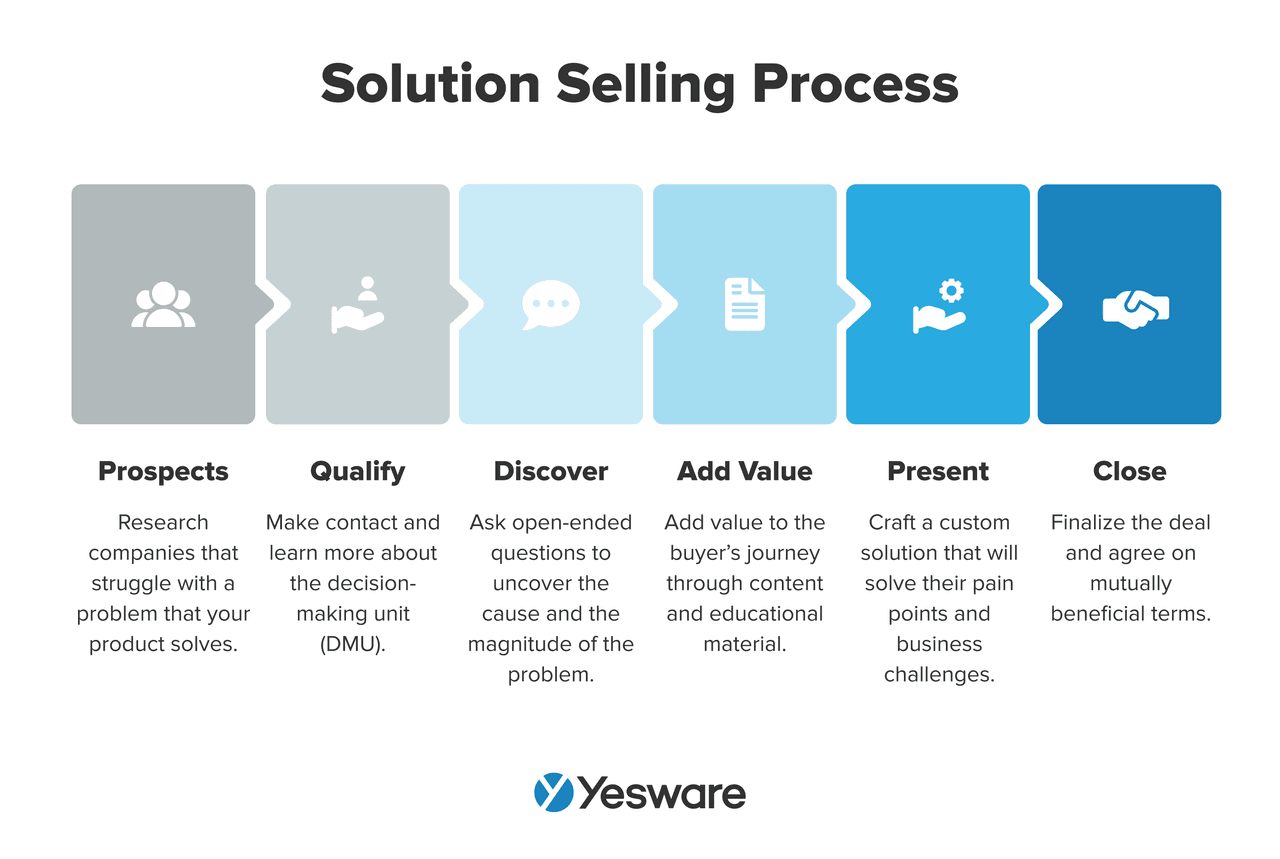
4. Social Selling
Social selling is a sales approach in which marketing and sales teams leverage their social media platforms for sales purposes. 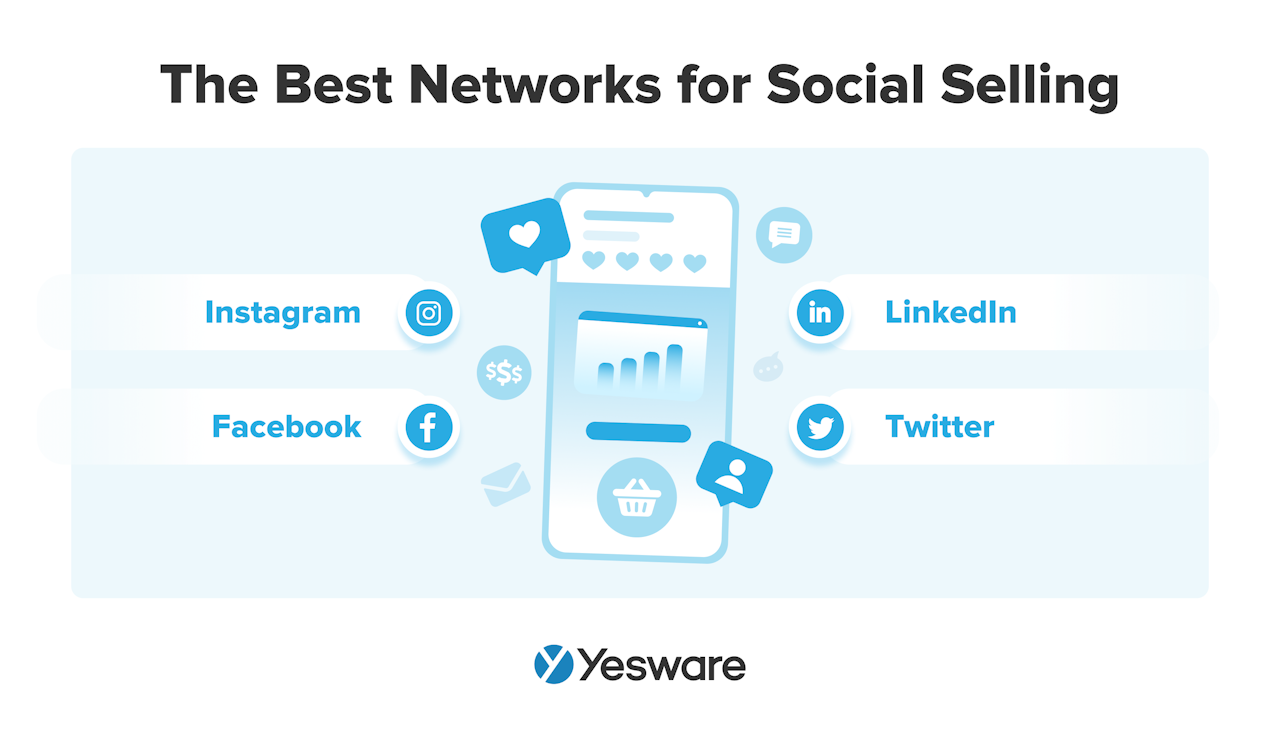 This approach is becoming increasingly popular, and for good reason.
This approach is becoming increasingly popular, and for good reason.
The numbers paint a bleak picture: 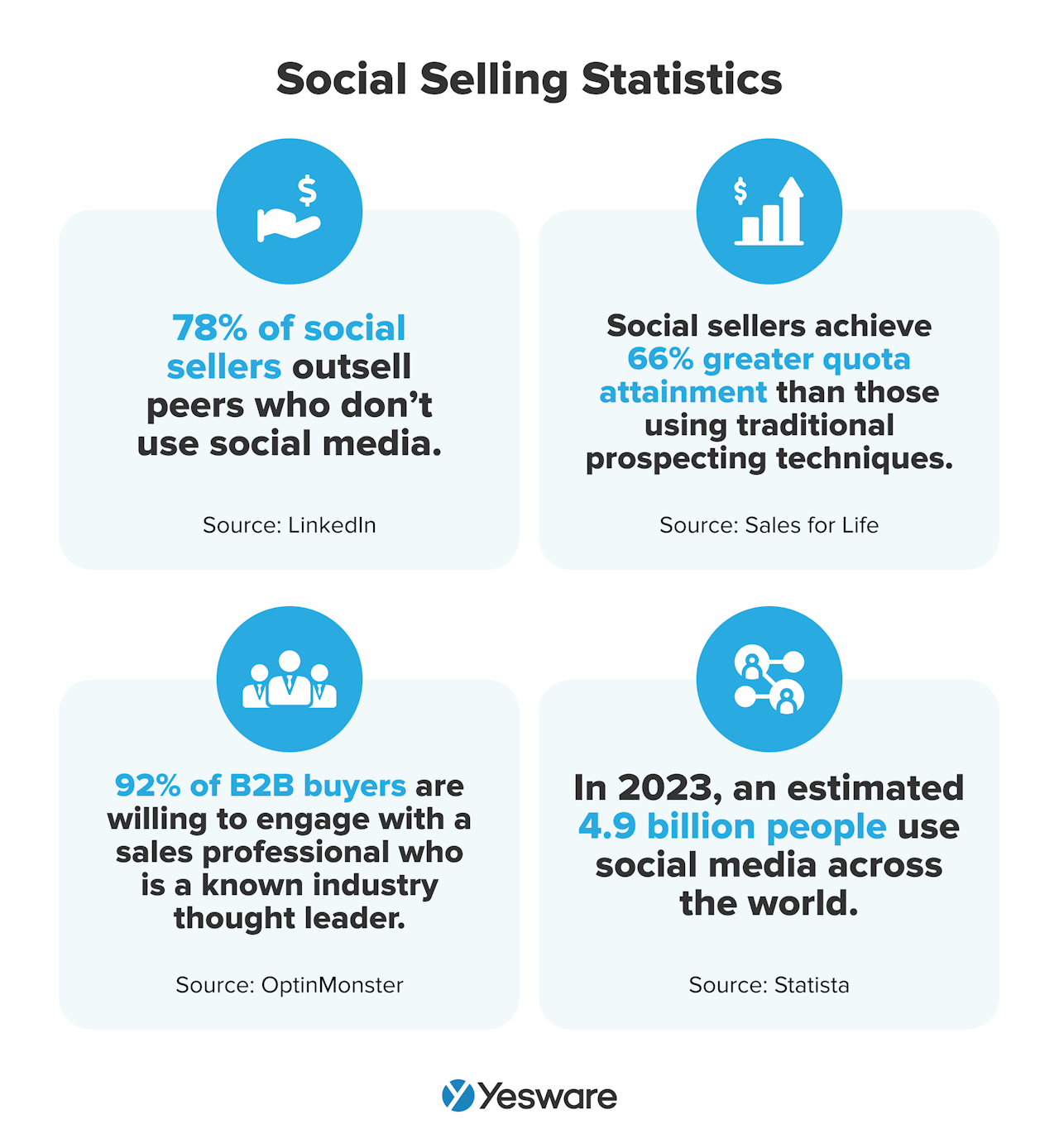 Social selling offers teams a great opportunity to demonstrate thought leadership and to interact with buyers in a more personalized and slightly less formal way.
Social selling offers teams a great opportunity to demonstrate thought leadership and to interact with buyers in a more personalized and slightly less formal way.
And with over 1 billion users on LinkedIn (and growing), social selling is an easy way to make new connections and generate new leads.
5. Value-Based Selling
Value selling is a sales approach that emphasizes an offer’s value proposition. 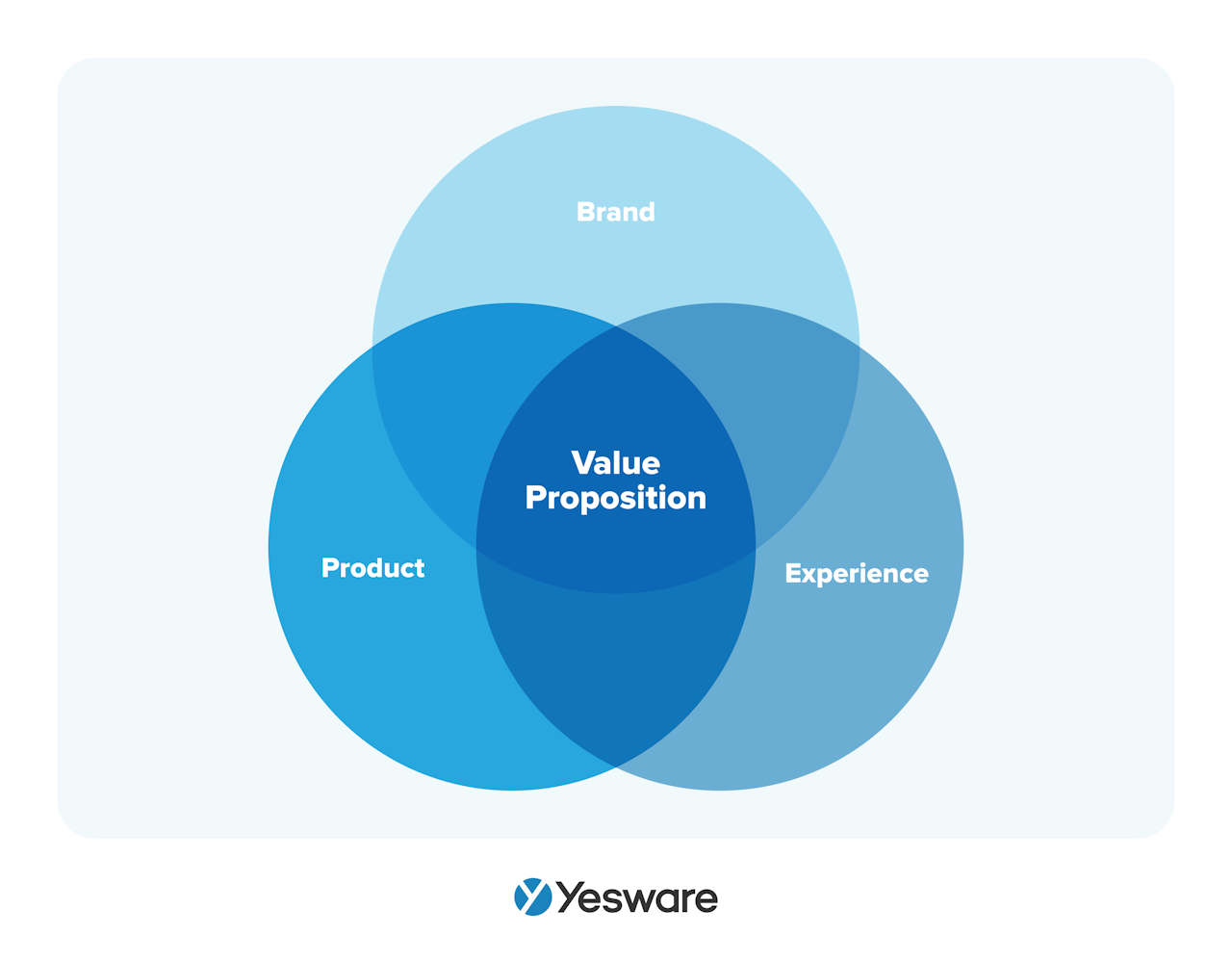 Sales reps who want to master this approach need to learn how to communicate their value proposition online, in person, and within phone sales conversations.
Sales reps who want to master this approach need to learn how to communicate their value proposition online, in person, and within phone sales conversations.
Value-selling sales reps also need to understand how to create a desire for their product based on its value.
In a value selling approach, sales reps should be ready to hit pause on a sales opportunity if the buyer isn’t demonstrating that they’re fully ready to commit.
6. Transactional Selling
Transaction selling is not a typical sales approach in B2B sales. This approach involves quick, one-time sales, which are often found in settings like retail, car dealerships, etc.
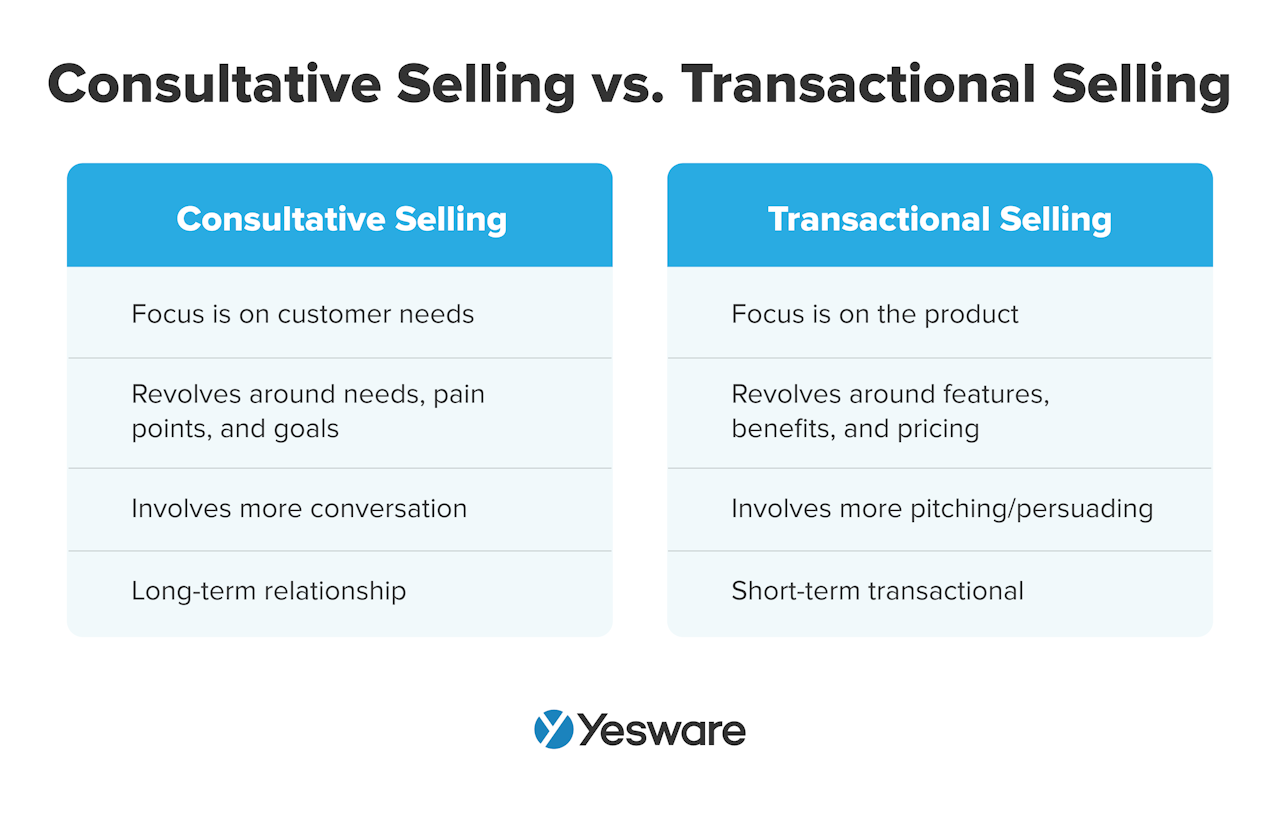 Transactional selling examples include:
Transactional selling examples include:
- Selling items like washing machines and refrigerators (consumers typically don’t buy more than one, and when they do, there’s a long time span between purchases)
- Limited-time membership offers
- Black Friday or Cyber Monday sales
Still, some parts of a transactional approach can be beneficial, even for B2B sales. You might, for example, offer a limited-time discount to encourage a fast, one-time purchase.
7. Soft Selling
A soft selling sales approach is one in which the sales rep specifically avoids pressuring the buyer into considering a purchase.
Sales reps practicing soft selling are encouraged to answer questions, make recommendations, and further educate buyers, but they shouldn’t offer their opinions or try to entice them to buy. 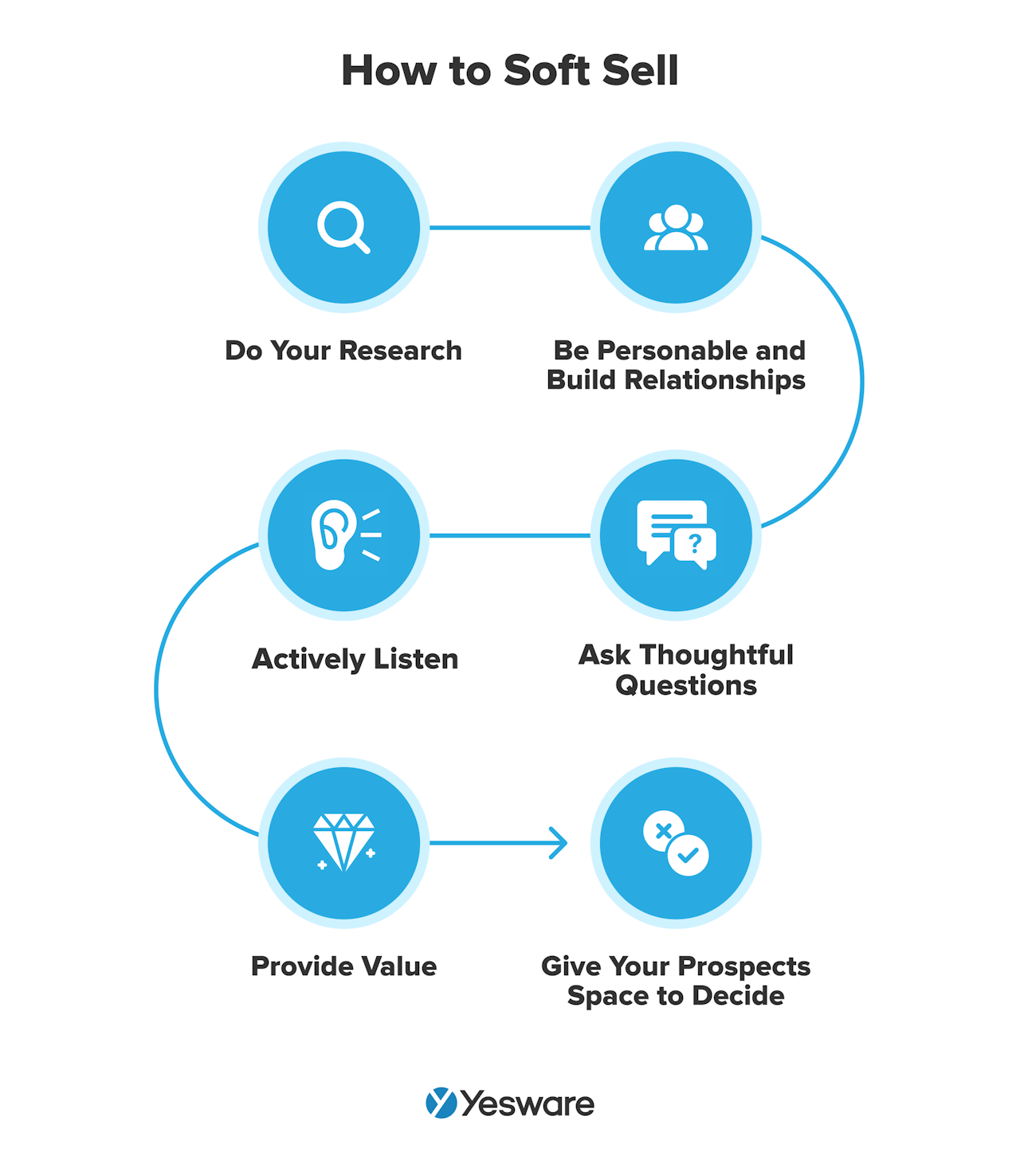 Soft selling is subtle and, like other sales approaches in our list, focuses heavily on trusting buyer-seller relationships.
Soft selling is subtle and, like other sales approaches in our list, focuses heavily on trusting buyer-seller relationships.
8. Hard Selling
Hard selling is the opposite of soft selling and includes a considerable amount of pressure from the salesperson.
This sales approach is often used when sellers want the customer to buy their product/service immediately. 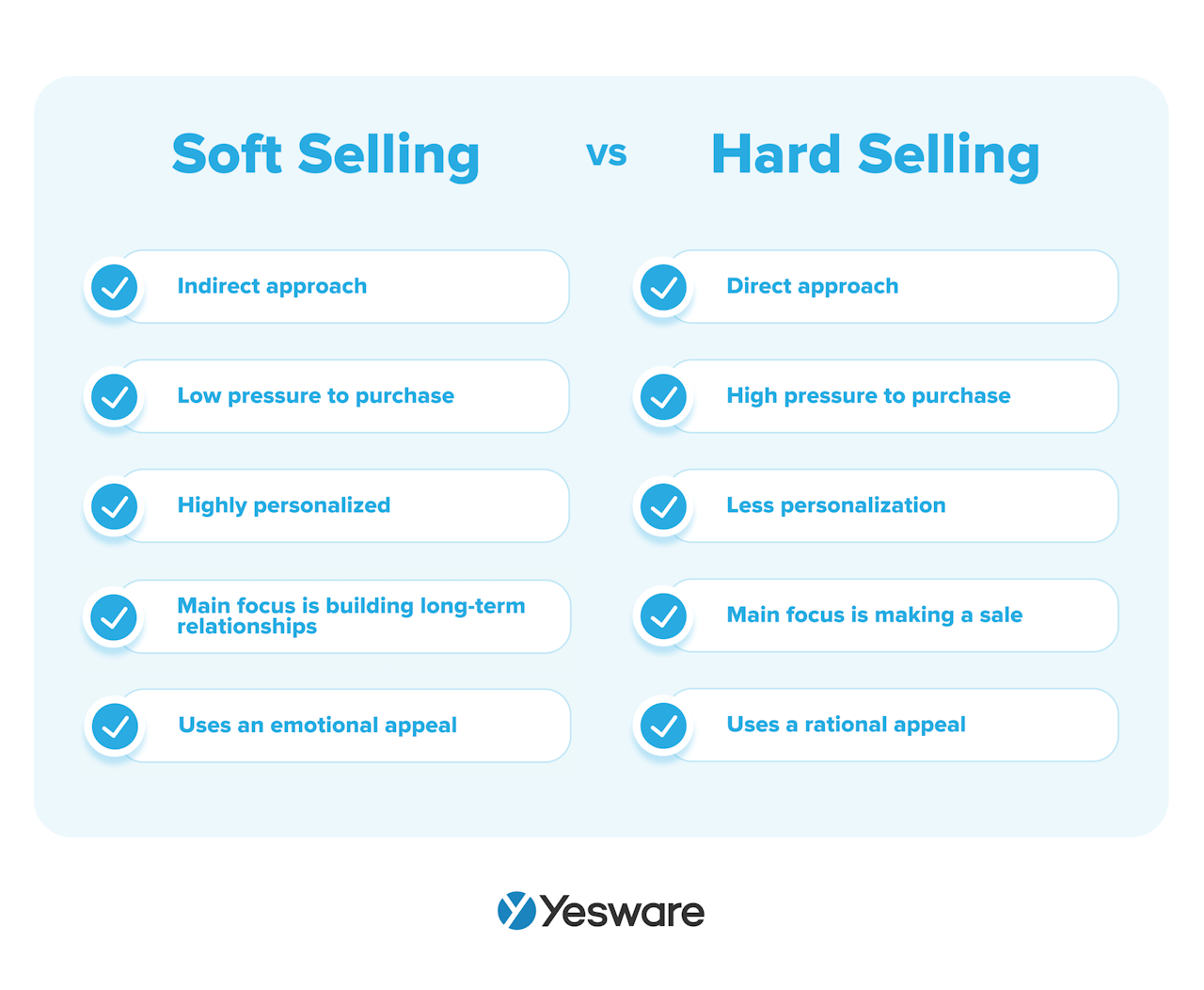 Effective hard selling requires tact and discretion. That being said, even when reps are skillful in how they apply pressure on the sale, hard selling is a clearly more direct approach than soft selling.
Effective hard selling requires tact and discretion. That being said, even when reps are skillful in how they apply pressure on the sale, hard selling is a clearly more direct approach than soft selling.
Some buyers feel that hard selling is too aggressive, but there are certain customer segments and/or sales scenarios in which this approach may be appropriate. Limited-time discounts, for example, can be a persuasive hard-selling tactic that creates urgency and encourages buyers to purchase immediately.
9. Guru Approach
The Guru Approach relies on a sales rep’s ability to connect more with buyers’ logic than their emotions.
With the Guru Approach, sales reps let the product do the talking for itself.
This is a particularly effective sales approach for target markets that do a lot of their own research or for highly technical products. The buyer personas who respond to this approach are typically calm and rational and may actually have an adverse reaction to emotional sales tactics.
Sales reps who want to become successful with the Guru Approach should practice sharing their expertise and need to be able to demonstrate influential thought leadership in their industry.
Sales teams can adopt strategies like hosting webinars or workshops for prospects and customers, as these offer great opportunities to showcase industry knowledge and establish credibility.
10. SNAP Selling
SNAP Selling (which stands for Simplicity, I(N)valuable, Alignment, and Priority) helps sales reps keep the customer’s needs at the forefront throughout the entire sales process.
Many reps use this sales approach when they know their buyer is busy and they need to be efficient. 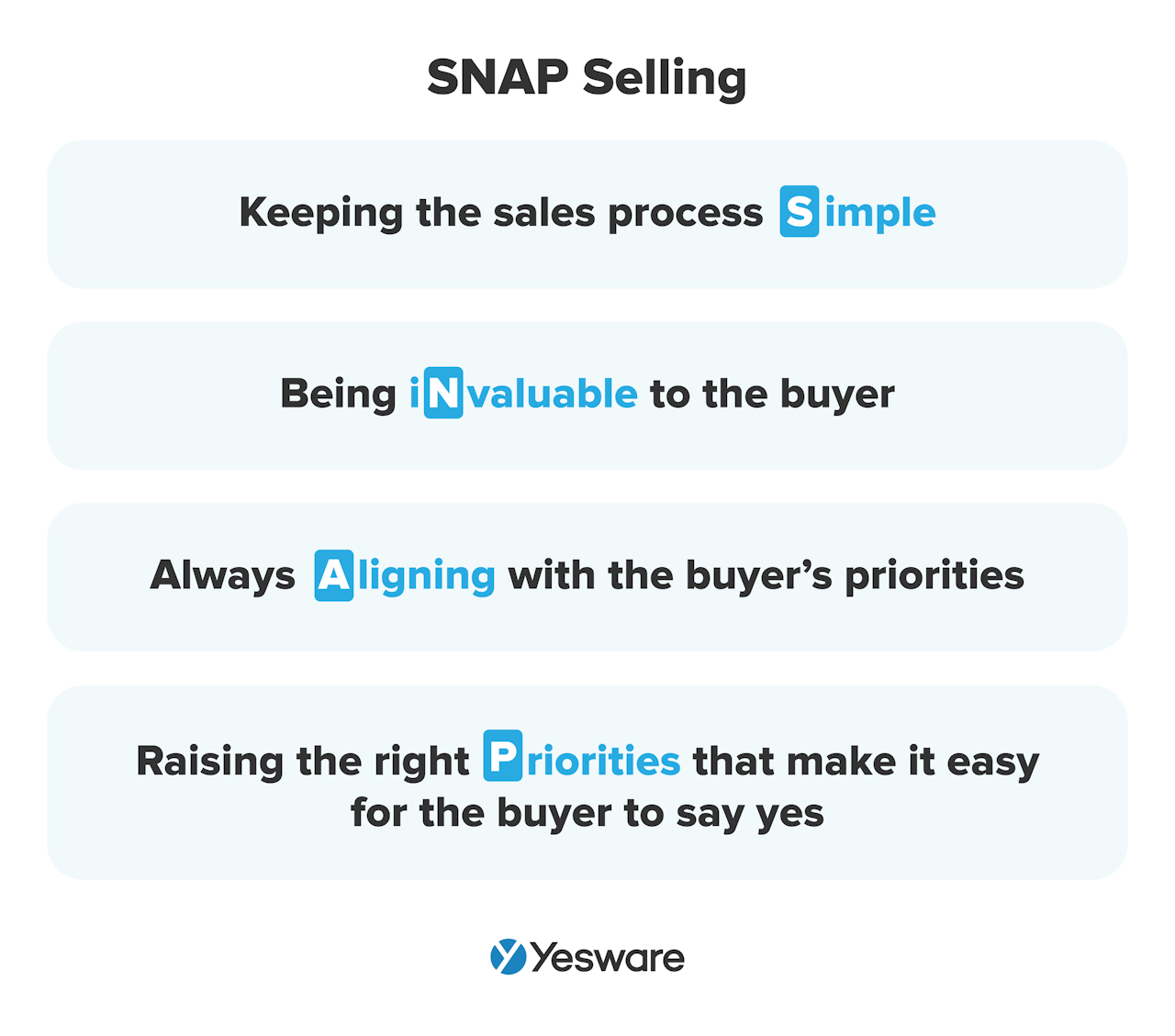 In other words, SNAP helps sellers connect with buyers efficiently and effectively.
In other words, SNAP helps sellers connect with buyers efficiently and effectively.
In a SNAP Selling approach, the sales rep treats the buyer as an equal, emphasizing respect for their time and expertise. They share a mutual goal of solving the buyer’s problem as efficiently as possible.
11. Target Account Selling
Target account selling is a B2B sales approach that encourages sales reps to focus their efforts on high-potential, high-value accounts.
This approach requires sales teams to do extensive research on best-fit prospects before they initiate outreach.
Sales teams can identify well-qualified accounts by creating and assessing them against ideal customer profiles (sales ICPs) and buyer persona profiles. 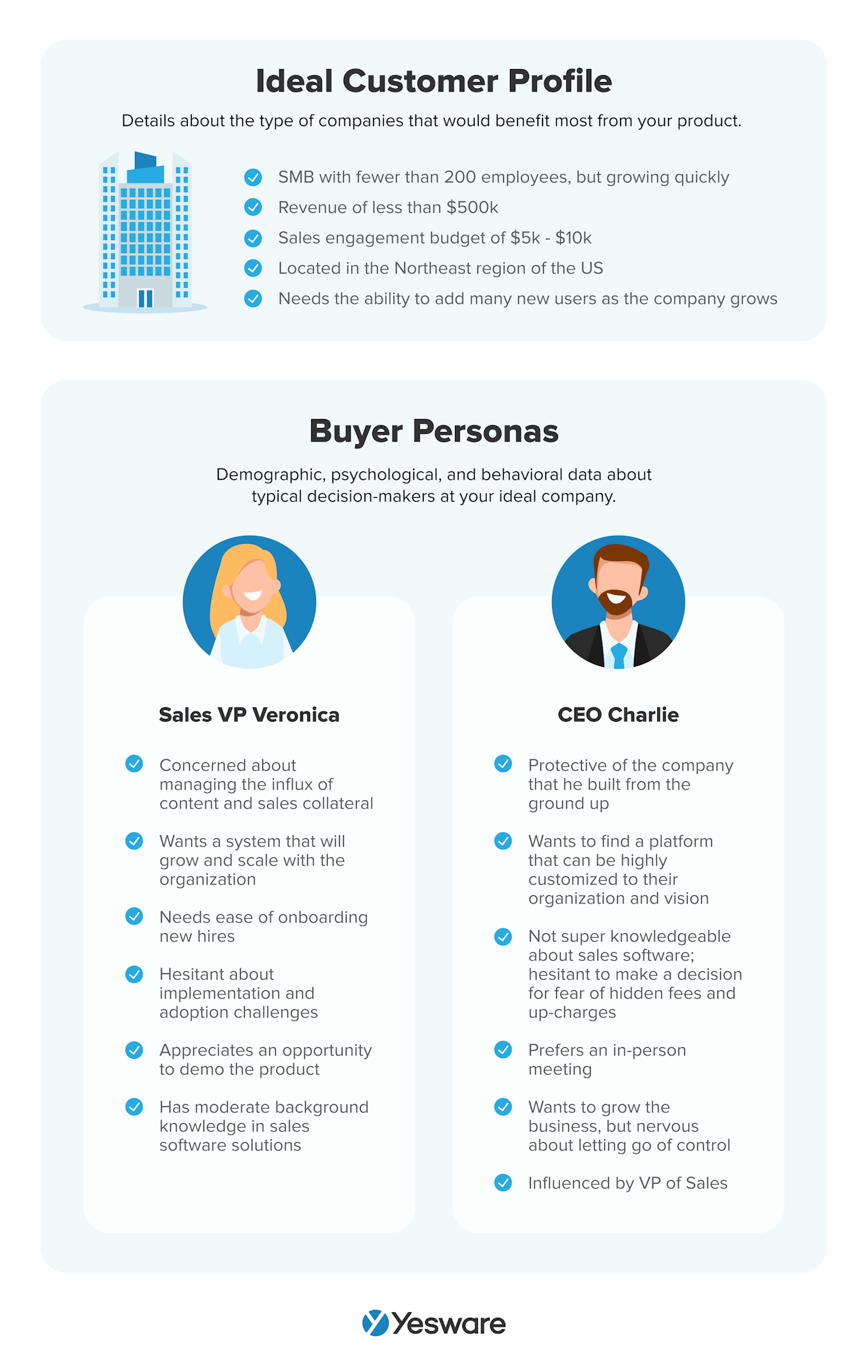 Sales automation platforms can greatly benefit target account selling. These tools can help teams quickly identify teams that match their demographic, firmographic, and technographic criteria.
Sales automation platforms can greatly benefit target account selling. These tools can help teams quickly identify teams that match their demographic, firmographic, and technographic criteria.
A target account sales approach is all about prioritizing the quality of your prospects over their quantity.
12. MEDDIC Selling
MEDDIC is another popular acronym when it comes to sales approaches; this one stands for: Metrics, Economic Buyer, Decision Criteria, Decision Process, Identify Pain, and Champion. 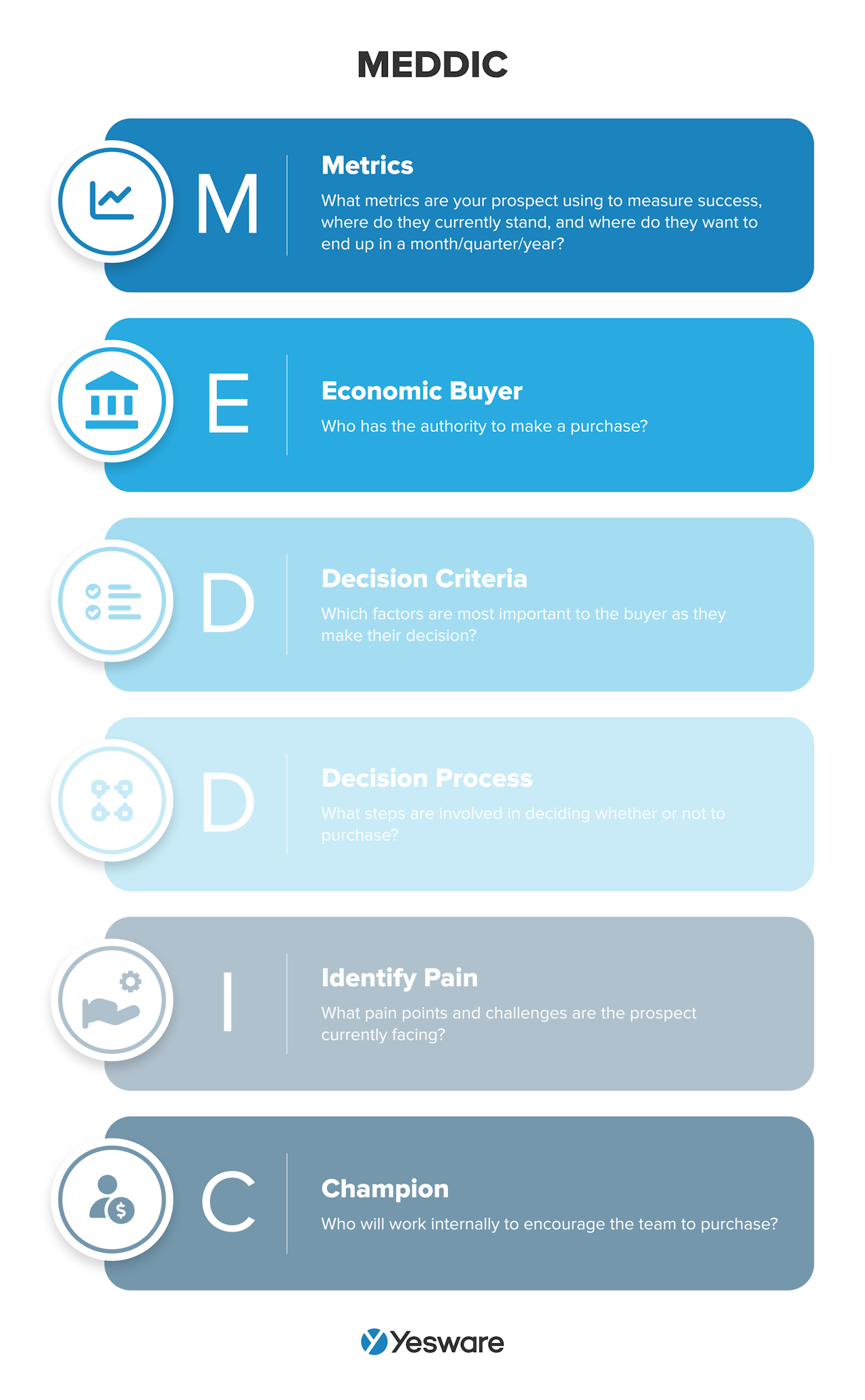 The MEDDIC sales approach helps sales teams pinpoint which prospects are worth their time, energy, and resources.
The MEDDIC sales approach helps sales teams pinpoint which prospects are worth their time, energy, and resources.
This is a particularly effective approach for businesses that sell higher-cost products.
The framework helps sales reps first determine which prospects meet the criteria for purchasing, and then helps them navigate how to address their pain points effectively.
What sales approaches are working in 2024? Grab our free ebook below, filled with data-backed findings on sales outreach and buyer engagement trends.
 Sales Engagement Data Trends from 3+ Million Sales ActivitiesLooking at millions of tracked email activity over the past few years, this ebook is filled with our top studies and findings to help sales teams accelerate results.
Sales Engagement Data Trends from 3+ Million Sales ActivitiesLooking at millions of tracked email activity over the past few years, this ebook is filled with our top studies and findings to help sales teams accelerate results.
How to Choose the Right Sales Approach
There are a variety of factors to consider when it comes to choosing the right sales approach, including your team’s skills, the industry you sell to, the preferences and needs of your target market, and the specifics of your product/service.
Above all, the sales approach you choose absolutely must meet the needs and preferences of your target buyer.
The sales rep’s job within any approach they choose is to help the prospect understand their issue, and come to an understanding about how to solve it.
In reality, most sales teams choose a mix-and-match approach when it comes to sales approaches. Some work better than others for certain reps, buyers, products, and stages of the sales process — flexibility is key.
How to Optimize Your Sales Approach for Faster Closes and Better Outcomes
Choosing the right sales approach is just the first step. To truly unlock faster closes, boost conversion rates, and drive superior business outcomes, sales teams must meticulously optimize and refine how they execute their chosen strategies. This involves a structured, data-driven methodology that focuses on efficiency, customer centricity, and continuous improvement.
Qualifying Rigorously & Eliminating Unqualified Leads
The most effective sales approaches are wasted on the wrong prospects. Rigorous qualification at the outset is paramount to ensuring your valuable time and resources are directed towards genuinely high-potential opportunities.
- Go Beyond Basic Criteria: While budget, authority, need, and timeline (BANT) are foundational, dig deeper. Qualify for cultural fit, willingness to change, internal champions, and alignment with your solution’s core strengths.
- Establish Clear Disqualification Triggers: Define specific criteria that signal a lead is not a good fit. Empower reps to disqualify gracefully and early, freeing them up to focus on viable prospects.
- Focus on Mutual Fit: A strong sales approach is about identifying prospects who genuinely stand to benefit from your solution, leading to more successful implementations and satisfied customers.
By dedicating time to robust qualification, you prevent your sales approach, no matter how refined, from being squandered on dead ends.
Maintaining Focus on High-Potential Opportunities
In a world of constant distractions, disciplined focus is a sales superpower. Once qualified, high-potential opportunities deserve your undivided attention.
- Prioritize ruthlessly: Implement a clear scoring or tiering system for leads. This ensures reps dedicate the most time and strategic effort to opportunities that offer the highest likelihood of conversion and long-term value.
- Develop Account Plans: For key accounts, create detailed plans that outline stakeholders, pain points, proposed solutions, and next steps. This ensures a consistent, coordinated approach, especially in complex sales cycles.
- Avoid “Comfort Zone” Selling: Don’t get stuck nurturing low-probability deals simply because they’re familiar. Regularly review your sales pipeline to reallocate time to truly promising opportunities.
Focused effort on the right opportunities ensures that your chosen sales approach is applied where it will yield the greatest impact.
Understanding the Customer’s Perspective (Beyond Needs)
While understanding customer needs is fundamental, optimizing your sales approach requires stepping completely into your customer’s shoes. This means grasping not just what they need, but why they need it, how they make decisions, and who influences those decisions.
- Uncover Individual Motivations: Beyond the company’s stated goals, what are the personal wins or challenges for your key contacts? How does this solution impact their job performance, career aspirations, or daily workflow?
- Map the Decision-Making Process: Understand their internal politics, budget cycles, procurement procedures, and the roles of all stakeholders (users, influencers, approvers, saboteurs).
- Identify Internal Champions: Find and empower individuals within the prospect’s organization who stand to gain the most from your solution and are willing to advocate for it internally.
- Anticipate Objections and Roadblocks: Use your deep understanding to foresee potential hurdles (budget, technical integration, change management) and proactively plan how to handle sales objections in your approach.

This holistic perspective allows you to tailor your communication, demonstrations, and value propositions to resonate deeply with all relevant parties, ensuring your approach is persuasive at every level.
Strategic Follow-Up and Nurturing
Consistent, value-driven follow-up is the glue that holds a sales approach together, especially in long sales cycles. It’s not just about “checking in”; it’s about adding value with every touch.

- Multi-Channel Approach: Don’t rely solely on email. Integrate phone calls, LinkedIn messages, video messages, and even relevant content shares to maintain engagement.
- Value-First Follow-Ups: Each follow-up should offer something new: a relevant industry insight, a useful resource, an answer to an anticipated question, or a summary of previous discussions. Avoid generic “just checking in” messages.
- Tailor to the Sales Cycle Stage: The frequency and content of your follow-ups should adapt as the prospect moves through their buying journey, becoming more detailed and solution-focused closer to the decision point.
- Nurture Long-Term Leads: For prospects not ready to buy now, implement a nurturing cadence that keeps them engaged with relevant content until their needs align.
Strategic follow-up reinforces your commitment to their success and ensures your relationship continues to grow, even when a deal isn’t imminent.
Leveraging Technology to Support Your Approach
In today’s sales landscape, technology is not a replacement for human connection but a powerful enabler of high-touch selling at scale. Tools seamlessly integrate with your chosen sales approach, making it more efficient and effective.
- CRM Systems (Customer Relationship Management): CRMs are the backbone, centralizing all customer data, interactions, and preferences. They ensure every rep has a 360-degree view, enabling truly personalized long-term engagement regardless of the chosen sales approach.

- Sales Engagement Platforms (SEPs) like Yesware!: SEPs are critical for executing any sales approach with precision. They allow for personalized communication at scale, managing complex follow-up cadences, and providing deep insights into prospect engagement (e.g., email opens, link clicks). This data empowers reps to know when and how to best intervene with high-value, human interactions, ensuring the personal touch is never lost, even across hundreds of prospects.

- Conversation Intelligence/AI: These tools analyze sales calls and meetings, providing invaluable insights into customer needs, objections, and sentiment. They can even coach reps on active listening, questioning techniques, and empathy, directly improving their execution of any relationship-centric sales approach.
- Automation: By automating mundane tasks like data entry, scheduling, and routine follow-ups, technology frees up sales professionals to dedicate more time to strategic thinking, deep discovery calls, and fostering the genuine human connections that define effective sales approaches.
Delivering an Exceptional Customer Experience
No matter which sales approach you adopt, the overarching goal should always be to deliver an exceptional customer experience. A positive experience from the very first touchpoint builds trust, reduces friction, and lays the groundwork for long-term loyalty.
- Consistency Across Touchpoints: Ensure your brand voice, responsiveness, and problem-solving capabilities are consistent across all interactions—from marketing, to sales, to customer success.
- Seamless Handoffs: When a deal moves from sales to implementation or support, ensure the transition is smooth and that the customer doesn’t have to repeat information.
- Proactive Support: Anticipate customer needs and offer solutions or resources before they even ask. This proactive approach reinforces your role as a trusted partner.
- Post-Sale Engagement: The sales relationship doesn’t end at the close. Continue to engage, check in on their success, and explore opportunities for further value delivery.
An exceptional customer experience transforms a successful sale into a lasting, profitable partnership.
Continuous Improvement & Iteration
The sales landscape is constantly evolving, and so too must your sales approach. Optimization is not a one-time fix but an ongoing process of learning, adapting, and refining.
- A/B Testing: Experiment with different messaging, cadences, and approaches. Use data to determine what resonates best with your target audience.

- Gather Feedback: Actively seek feedback from both wins and losses. What did customers appreciate? Where could the approach be improved? Conduct win/loss analyses.
- Sales Coaching and Training: Regularly review sales calls, provide targeted coaching, and invest in ongoing training to help reps master old and new sales techniques.
- Stay Informed: Keep abreast of industry trends, new sales methodologies, and technological advancements. What worked last year might not be as effective today.
By embracing a culture of continuous improvement, your sales team can ensure its approach remains sharp, relevant, and consistently effective in driving sales success.
How to Implement Sales Approaches
The key to implementing new sales approaches is to be flexible. It’s perfectly okay to experiment with different approaches, strategies, and tactics until you find the specific components that work best for your team and your target audience.
Yesware can help sales teams track and monitor the success of their various sales approaches and how well they’re resonating with prospects.
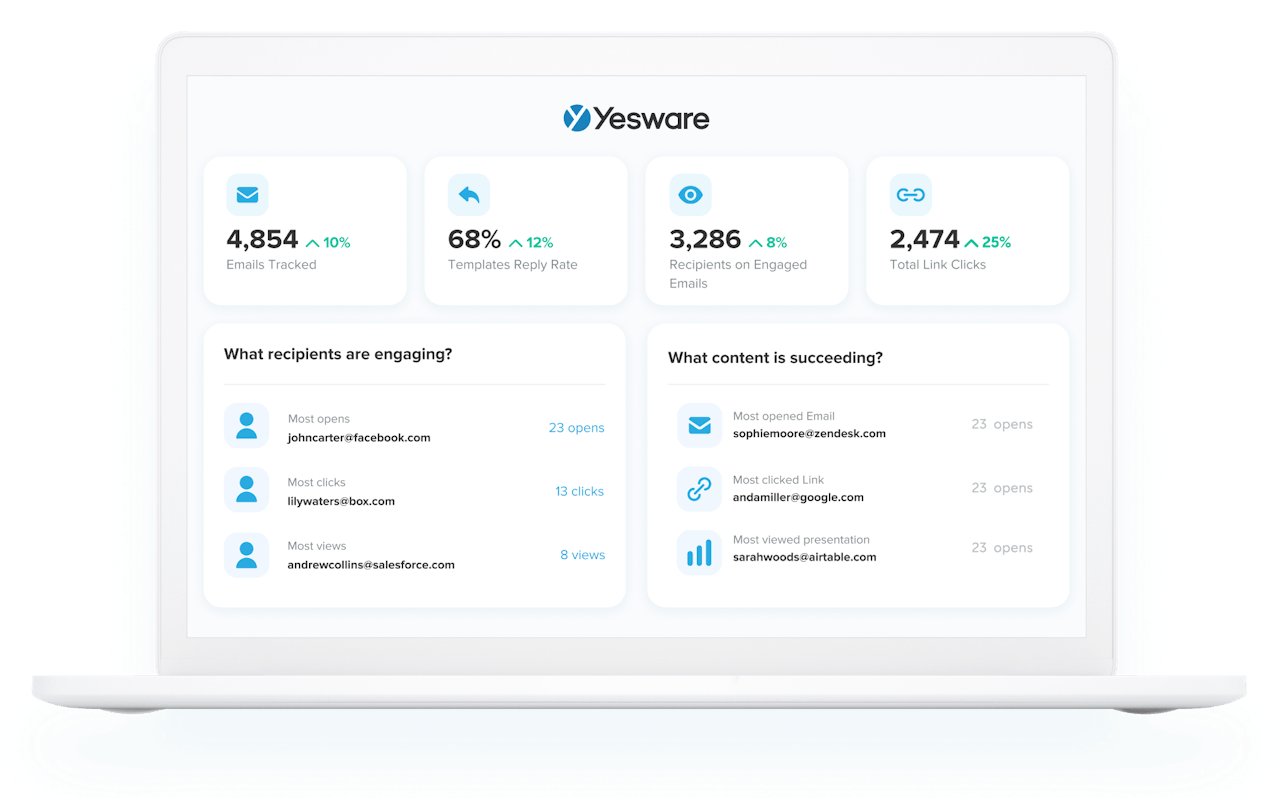 Effective sales training and sales coaching can also make a big difference when it comes to the success of implementing new sales approaches.
Effective sales training and sales coaching can also make a big difference when it comes to the success of implementing new sales approaches.
Above all, make sure the sales approach(es) you choose to use with your target market is tailored to meet their needs — not those that fit your team or your product best.
The more that sales leaders can communicate confidence in their suggested approaches, the more the entire team will be on board.
Conclusion
Mastering your sales approach is not merely about closing a single deal; it’s about cultivating enduring partnerships that yield consistent value over time. In today’s dynamic market, the ability to build and nurture these invaluable connections is what truly differentiates top-performing sales professionals and ensures sustainable business success.
By strategically selecting and optimizing your sales approach, you move beyond transactional thinking towards a philosophy of mutual benefit, empathy, and a deep commitment to your customer’s journey, unlocking unprecedented levels of loyalty, referrals, and sustained revenue growth.
The most successful sales approaches are those that are not only thoughtfully chosen but also meticulously implemented, continuously tracked, and iterated upon to meet evolving buyer needs as fully as possible. This is where modern sales technology becomes an indispensable ally.
A sophisticated Sales Engagement Platform (SEP) like Yesware is specifically designed to empower sales reps to excel at optimizing any sales approach, allowing them to scale their personalized efforts without sacrificing authenticity. Yesware provides the crucial data and automation necessary to refine your strategy:
- Personalized Communication: Craft and deploy tailored messages at scale, ensuring every outreach, email, or follow-up feels highly relevant and personal to the individual.
- Strategic Follow-Up & Nurturing: Manage complex multi-channel cadences with precision, keeping prospects engaged and nurtured with value-driven content throughout even the longest sales cycles.
- Actionable Engagement Insights: Gain real-time visibility into how prospects interact with your communications (opens, clicks, replies). This intelligence empowers you to perfectly time your personalized interventions, ensuring your high-touch efforts are always impactful.
- Automation for Deeper Connections: By streamlining routine tasks, Yesware frees up valuable time for sales professionals to focus on the human-centric aspects of their sales approach – conducting deep discovery, building rapport, and truly understanding customer challenges.
Ready to transform your sales approach from transactional to truly relational, drive faster closes, and build a future of loyal customers and consistent growth?
Discover how Yesware can empower your team to optimize their sales approach, build lasting relationships, and achieve exceptional results. Try Yesware for free today and experience the difference of high-touch selling, at scale.
Frequently Asked Questions About Sales Approaches
Q1: What exactly is a “sales approach”?
A sales approach refers to the comprehensive strategy, techniques, and tactics that sales professionals use to engage potential customers, move them through the sales pipeline, and ultimately close deals. It encompasses everything from how you initiate contact and build rapport to how you present solutions, handle objections, and follow up. Unlike a rigid script, a sales approach is a flexible framework adapted to different buyers and situations.
Q2: Why is choosing the right sales approach so important for my business?
Choosing and mastering the right sales approach is crucial because it directly impacts your sales performance and overall business success. A well-aligned approach helps you:
- Connect better with buyers: Different buyers respond to different styles.
- Accelerate sales cycles: Efficiently guide prospects to a decision.
- Increase conversion rates: Improve your chances of turning leads into customers.
- Boost customer satisfaction and loyalty: By addressing specific needs and building trust.
- Drive higher revenue and profitability: Through more effective and efficient sales efforts.
Q3: How do I determine which sales approach is best for my product or industry?
Selecting the best sales approach involves careful consideration of several factors:
- Your Product/Service: Is it complex or simple? High-value or low-cost?
- Your Target Market: Who are your ideal customers? What are their buying habits, pain points, and preferences?
- Your Sales Team’s Skills: What are your reps’ strengths and weaknesses?
- Your Industry: What are the common sales cycles and customer expectations in your specific sector?
- Your Business Goals: Are you focused on rapid acquisition, long-term relationships, or solving complex problems?
Often, the most effective strategy involves combining elements from different approaches (e.g., a consultative approach with social selling tactics).
Q4: Can I use more than one sales approach simultaneously?
Absolutely! In fact, most successful sales organizations utilize a blend of sales approaches. A single deal might require a consultative approach for discovery, elements of relationship selling to build trust, and value-based selling to articulate the solution’s impact. The key is to understand each approach’s strengths and weaknesses and to be adaptable enough to pivot between them as the sales situation and customer needs evolve.
Q5: How does technology like a Sales Engagement Platform (SEP) enhance my chosen sales approach?
Technology is a powerful enabler for optimizing any sales approach. A Sales Engagement Platform (SEP) like Yesware helps by:
- Automating mundane tasks: Freeing reps to focus on high-value human interactions.
- Enabling personalization at scale: Allowing you to send tailored messages to many prospects efficiently.
- Providing crucial insights: Showing you how prospects engage with your content, so you know when and how to follow up effectively.
- Ensuring consistent follow-up: Managing complex cadences to prevent leads from falling through the cracks, reinforcing your commitment to the customer.
By handling the operational heavy lifting, SEPs empower sales professionals to truly excel at the “high-touch” elements of their sales approach.
Q6: What are the common pitfalls to avoid when implementing a new sales approach?
When implementing a new sales approach, be wary of:
- Lack of Training: Rolling out an approach without adequate training and ongoing coaching.
- Rigidity: Trying to force a “one-size-fits-all” approach on every prospect.
- Ignoring Data: Not tracking key metrics to understand what’s working and what isn’t.
- Poor Qualification: Wasting time on leads that aren’t a good fit, regardless of the approach.
- Inconsistent Follow-up: Failing to maintain engagement throughout the buyer’s journey.
- Short-Term Thinking: Focusing only on the immediate close rather than building long-term relationships.
Avoiding these pitfalls requires a commitment to continuous learning, adaptation, and leveraging technology to support your efforts.
This article was updated on June 18th, 2025, to include the latest information and insights.
Get sales tips and strategies delivered straight to your inbox.
Yesware will help you generate more sales right from your inbox. Try our Outlook add-on or Gmail Chrome extension for free, forever!
Related Articles
Casey O'Connor
Casey O'Connor
Casey O'Connor
Sales, deal management, and communication tips for your inbox

